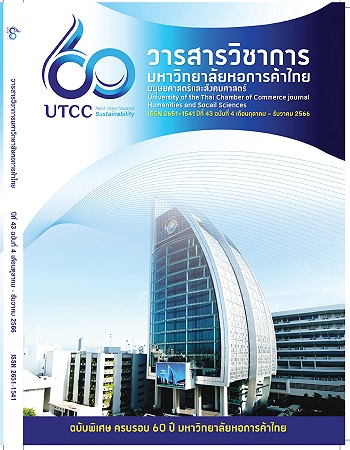Factors Effecting on Voluntary Tax Compliance and Tax Measures of Listed Companies in Stock Exchange of Thailand
Main Article Content
Abstract
This research aimed to (1) analyze government management that affects voluntary tax compliance; (2) analyze government management that affects tax incentives on voluntary tax compliance; (3) compare general information of respondents and government management, and (4) to develop tax measures to encourage listed companies in Stock Exchange of Thailand to pay taxes voluntarily.
The sample group was the chief financial officers. This research was mixed methods. For the quantitative research, a questionnaire was used to collect data from a sample of 380 participants using the stratified sampling method. Subsequently, the collected data was analyzed using the Structural Equation Model. The qualitative research conducted in-depth interviews with 9 people to validate the results of the quantitative research. The findings revealed that government management had direct and indirect positive influences on voluntary tax compliance. There were different opinions on government management from different genders and industry groups, while opinions on government management from different ages, levels of education, and work experience were indifferent with a statistically significant level of 0.05. The results of qualitative research revealed that the key informants had consistent opinions and were able to develop 8 tax measures to promote voluntary tax payments.
Article Details

This work is licensed under a Creative Commons Attribution-NonCommercial-NoDerivatives 4.0 International License.
ลิขสิทธิ์ของบทความ
ผลงานที่ได้รับการตีพิมพ์ถือเป็นลิขสิทธิ์ของมหาวิทยาลัยหอการค้าไทย ห้ามมิให้นำเนื้อหา ทัศนะ หรือข้อคิดเห็นใด ๆ ของผลงานไปทำซ้ำ ดัดแปลง หรือเผยแพร่ ไม่ว่าทั้งหมดหรือบางส่วนโดยไม่ได้รับอนุญาตเป็นลายลักษณ์อักษรจากมหาวิทยาลัยหอการค้าไทยก่อน
References
กัลยา วานิชย์บัญชา. (2548). สถิติสำหรับงานวิจัย. กรุงเทพฯ: จุฬาลงกรณ์มหาวิทยาลัย.
ไกรยุทธ ธีรตยาคีนันท์. (2521). ทฤษฎีภาษีเงินได้และภาษีเงินได้ของไทย. กรุงเทพฯ: ดวงกมล.
เจริญ ธฤติมานนท์. (2544). ความสมัครใจในการเสียภาษี. กรุงเทพฯ: สรรพากรสาส์น.
เดือนเด่น นิคมบริรักษ์, วีรวัลย์ ไพบูลย์จิตต์อารี, พรชัย ฬิลหาเวสส, และศิริกาญจน์ เลิศอำไพนนท์. (2554). ปัญหาการทุจริตคอร์รัปชั่นในวงการธุรกิจเอกชนไทยกับแนวทางแก้ไขและป้องกัน. กรุงเทพฯ: มูลนิธิสถาบันวิจัยเพื่อการพัฒนาประเทศไทย.
พวงรัตน์ ทวีรัตน์. (2543). วิธีการวิจัยทางพฤติกรรมศาสตร์และสังคมศาสตร์ (พิมพ์ครั้งที่ 7). กรุงเทพฯ: มหาวิทยาลัยศรีนครินทรวิโรฒ, สำนักทดสอบทางการศึกษาและจิตวิทยา.
วิรันต์ภรณ์ โรจนวิภาตวนิช. (2560). Border Adjustment Tax: ทางเลือกนโยบายการค้าแบบใหม่ของสหรัฐฯ. สืบค้นเมื่อ 17 พฤษภาคม 2562, จาก https://www.scbeic.com/tdetail/product/ 3432
สมคิด บางโม. (2538). องค์การและการจัดการ. กรุงเทพฯ: วิทยพัฒน์.
สำนักงานพัฒนารัฐบาลดิจิทัล. (2565). ภาษีมาจากไหน. สืบค้นเมื่อ 2 พฤศจิกายน 2565, จาก https://govspending.data.go.th/dashboard/5
สุชาติ ประสิทธิ์รัฐสินธุ์. (2558). การเขียนข้อเสนอโครงการวิจัยเชิงปริมาณ เชิงคุณภาพและแบบผสมที่ถูกต้องได้มาตรฐานสากล. กรุงเทพฯ: สามลดา.
สุภมาส อังศุโชติ, และ ชูชาติ พ่วงสมจิตร์. (2554). การวิเคราะห์และการแปลผลข้อมูล. สืบค้นเมื่อ 17 พฤษภาคม 2562, จาก old.elearning.yru.ac.th/pluginfile.php/31356/mod_resource/content/2/การแปลผลบทที่%209.pdf
Aguirre, B., & Rocha, F. F. (2010). Trust and tax morale in Latin American and Caribbean countries. Retrieved February 2, 2021, from https://extranet.sioe.org/uploads/isnie2010/basilia_fabiana.pdf
Alm, J., & McKee, M. (2006). Audit certainty, audit productivity, and taxpayer compliance. National Tax Journal, 59(4), 801-816.
Alm, J., & Torgler, B. (2006). Culture differences and tax morale in the United States and Europe.
Journal of Economic Psychology, 27(2), 224-246. doi:10.2139/ssrn.562861
Chandarasorn, M. (2012). Public management as citizen compliance: A case study of income tax compliance behavior in Thailand (Doctoral dissertation, University of Kansas). Retrieved from https://kuscholarworks.ku.edu/bitstream/handle/1808/10280/Chandarasorn_ku_0099D_12302_DATA_1.pdf?sequence=1&isAllowed=y
Hair, J. F., Black, W. C., Babin, B. J., & Anderson, R. E. (2010). Multivariate data analysis (7th ed.). New York, NY: Pearson.
Idowu, A. S., Oluwatoyin, A. H., & Nguavese, N. M. (2020). Gender diversity and tax compliance in Lagos State. Journal of Academic Research in Economics, 12(2), 198-209. Retrieved from https://www.jare-sh.com/downloads/jul_2020/idowu.pdf
Jackson, B. R., & Milliron, V. C. (1986). Tax compliance research: Findings, problems, and prospects. Journal of Accounting Literature, 5, 125-165.
James, S. R., & Nobes, C. (2000). The economics of taxation: Principles, policy, and practice (7th ed.). Essex, England: Pearson Education.
Jerene, W., & Adimasu, N. (2016). Determinants of voluntary tax compliance behavior in self assessment system: Evidence from SNNPRS, Ethiopia. International Journal of Science and Research (IJSR), 5(12), 967-973. doi:10.21275/ART20163576
John W. Best. (1981). Research in Education. 4 th ed. New Jersey: Prentice – Hall Inc., p.182.
Kline, R. B. (2011). Principles and practice of structural equation modeling (3rd ed.). New York, NY: Guilford Press.
Levi, M. (1998). A state of trust. In V. Braithwaite, & M. Levi (Eds.), Trust and governance (pp. 77-101). New York, NY: Sage.
Marcelo, C. (2009). Strategic adoption in a two-sided market: A study of college applications in Brazil. Chicago, IL: University of Chicago, Department of Economic.
Mikesell, J. L., & Birskyte, L. (2007). The tax compliance puzzle: Evidence from theory and practice. International Journal of Public Administration, 30(10), 1045-1081. doi:10.1080/01900690701221423
Oberholzer, R. (2008). Attitudes of South African taxpayers towards taxation: A pilot study. UPSpace Collection, 1(7), 44-69.
Palil, M. R. (2010). Tax knowledge and tax compliance determinants in self assessment system in Malaysia (Doctoral dissertation, University of Birmingham). Retrieved from https://core.ac.uk/download/pdf/76107.pdf
Park, C.-G., & Hyun, J. K. (2003). Examining the determinants of tax compliance by experimental data: A case of Korea. Journal of Policy Modeling, 25(8), 673-684.
Robbins, S. P., & Coulter, M. (2008). Management (10th ed.). Upper Saddle River, NJ: Pearson Prentice Hall.
Santi, A. N., & Zulaikha, Z. (2012). Analisis pengaruh kesadaran perpajakan, sikap rasional, lingkungan, sanksi denda dan sikap fiskus terhadap kepatuhan wajib pajak (studi empiris pada WPOP di wilayah KPP pratama semarang). Retrieved from http://eprints.undip.ac.id/35025/1/Skripsi_01.pdf
Seligman, E. R. A. (1911). The income tax: A study of the history, theory and practice of income taxation at home and abroad. New York, NY: Macmillan.
Sheffrin, S. M., & Triest, R. K. (1991). Can brute deterrence backfire? Perceptions and attitudes in taxpayer compliance. Davis, CA: California Davis, Institute of Governmental Affairs.
Slemrod, J. (2007). Cheating ourselves: The economics of tax evasion. Journal of Economic Perspectives, 21(1), 25-48. doi:10.1257/jep.21.1.25
Tehulu, T. A., & Dinberu, Y. D. (2014). Determinants of tax compliance behavior in Ethiopia: The case of Bahir Dar City taxpayers. Journal of Economics and Sustainable Development, 5(15), 268-273. Retrieved from https://core.ac.uk/download/pdf/234646522.pdf
Torgler, B. (2003). Tax morale, rule-governed behaviour, and trust. Constitutional Political Economy, 14(2), 119-140.
doi:10.1023/A:1023643622283
Tyler, T. R. (1997). The psychology of legitimacy: A relational perspective on voluntary deference to authorities. Personality and Social Psychology Review, 1(4), 323-345. doi: 10.1207/s15327957pspr0104_4
Yimam, S., & Asmare, F. (2020). Gender and tax compliance: Firm level evidence from Ethiopia. East Sussex, England: International Centre for Tax and Development.


